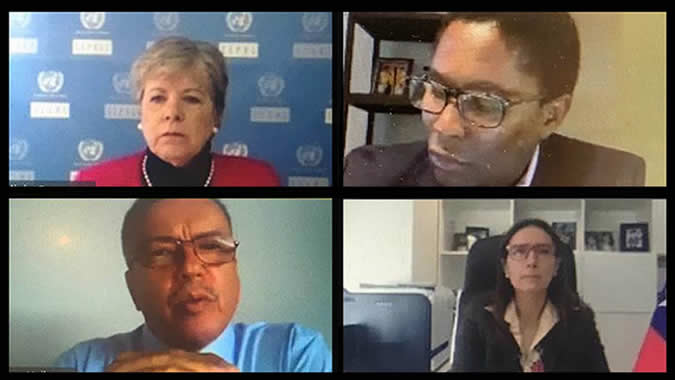Resilient, Inclusive and Low-Carbon Economy as the Guiding Axis for the Post-Pandemic Economic Recovery: Alicia Bárcena
Work area(s)
ECLAC’s Executive Secretary led a virtual meeting today on the role of climate action in the recovery from the COVID-19 crisis, in which she called for forging compacts and prioritizing sectors for an environmental big push.

The COVID-19 pandemic has exposed structural problems of the current economic model, confirming the need to rethink development. Thus, a resilient, inclusive and low-carbon economy must be the guiding axis for the post-coronavirus economic recovery, Alicia Bárcena, Executive Secretary of the Economic Commission for Latin America and the Caribbean (ECLAC), sustained today during a virtual meeting on the role of climate action in the recovery from the COVID-19 crisis.
Participating in the meeting’s opening segment, along with Alicia Bárcena, were Selwin Hart, Special Advisor to the Secretary-General and Assistant Secretary-General of the United Nations Climate Action Team; Carolina Schmidt, Minister of Environment of Chile and President of COP 25; and Leo Heileman, Regional Director of the United Nations Environment Program in Latin America and the Caribbean.
After the opening segment, the speakers included Ricardo José Lozano, Minister of Environment and Sustainable Development of Colombia; Adianez Taboada, Deputy Minister of Science, Technology and Environment of Cuba; Arturo Argueta, Undersecretary for Environmental Planning and Policy of Mexico; and Gabriel Quijandría, Deputy Environment Minister of Peru. Also participating were Abelardo Llosa, Director of the Biodiversity Secretariat at Argentina’s Ministry of Environment and Sustainable Development; Andrea Meza, Director of Climate Change at the Ministry of Environment and Energy of Costa Rica; Karina Salinas, Ecuador’s National Director of Adaptation to Climate Change; and Ligia Castro, a Climate Change Advisor at Panama’s Environment Ministry.
In her remarks, Alicia Bárcena stated that “we are at a civilizing crossroads and the ethical imperative is to rebuild, change the development model for one with greater equality, with a more solidarity-based economy. We need to take on precisely those big structural gaps that we continue to face and that we have accumulated over many years, and prevent another lost decade.”
ECLAC’s Executive Secretary stressed the importance of understanding that the crisis caused by the coronavirus pandemic “made us abandon the world of speculation and suddenly rooted us in what is real, and what is tangible. The lesson is that the world to come must be rebuilt on the basis of what is tangible, and one of the most tangible parts are the ecosystems, cities, people,” she expressed.
She warned that if the post COVID-19 economic recovery has the same environmental consequences as those seen before the pandemic, we will witness a deepening of the climate and water crises. This would mean leaving one crisis to go into another of an even more global nature, with a much longer duration, and with more enduring and damaging effects, she said.
She added that compacts are needed in strategic, priority sectors to move towards a transition of an agro-ecological, energy, cultural, civic and governance-related nature.
“At ECLAC, we have prioritized the Escazú Agreement as that great civic instrument for access to information, justice and participation in environmental matters,” she underscored.
Alicia Bárcena recalled estimates indicating that the pandemic’s effects will produce the biggest recession experienced by the region since 1914 and 1930, with growth projected at -5.3%, a significant deterioration in labor indicators in 2020 that will leave nearly 12 million more people unemployed in the region, and an increase of nearly 30 million people living in poverty, to reach a total of 214.7 million people (or 34.7% of the region’s population).
The rise in extreme poverty is especially worrisome, the senior United Nations official warned, with a 2.6 percentage point increase foreseen (15.9 million more people) to affect 83.4 million people in all.
That is why ECLAC proposes providing a basic emergency income (BEI) equivalent to one poverty line (the per capita cost of acquiring a basic food basket and meeting other basic needs) over the course of six months to the entire population living in poverty in 2020 (meaning 215 million people, or 34.7% of the region’s population). This would entail additional spending of 2.1% of GDP to reach all the people who will find themselves in situations of poverty this year.
Alicia Bárcena emphasized that it is necessary to forge compacts for a more sustainable or green recovery, through a new production-society-environment equation, identifying the sectors that are a priority for more sustainable development and combining and coordinating fiscal, budgetary, regulatory and investment-related instruments, in line with ECLAC’s proposition for a Big Push for Sustainability. This combination of instruments will produce a business environment that favors sustainable investment, generating a virtuous cycle of economic growth, job creation and a transition towards a low-carbon production matrix, she stated.
Finally, the senior United Nations official stressed the need to reinvest in a welfare state that would include social protection as well as the preservation of our natural wealth.
“The future we want is not a new normality. That normality has passed, that world is finished, we need a better one,” she asserted.
Type
Country(ies)
- Latin America and the Caribbean